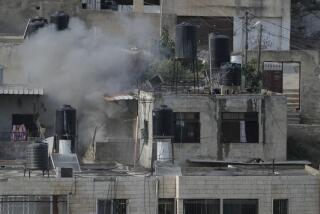Egypt Toughens Stance on POW Deaths : Mideast: Cairo presses Israel for probe of alleged slayings in 1956 and 1967. Some fear revelations could damage relations.
- Share via
CAIRO — The Egyptian government has yielded to public demands and is taking an increasingly tough position in a controversy it would rather avoid: the alleged killing of Egyptian prisoners of war by Israeli soldiers in the wars of 1956 and 1967.
In comments published Thursday in the local press, Osama al-Baz, President Hosni Mubarak’s top political adviser, rejected Israel’s claim that too much time has elapsed to interview eyewitnesses. He reiterated Egypt’s demand that a full Israeli investigation be conducted.
His comments came after a meeting in Cairo with Eli Dayan, the Israeli deputy foreign minister, who said Israel is willing to compensate the families of the Egyptian prisoners of war. Dayan told reporters for Al Ahram, a semiofficial Egyptian daily, that he did not promise Osama an investigation but would take the request back to Israel.
At the same time, David Sultan, Israel’s ambassador to Egypt, dismissed as “baseless” reports circulating here that he was involved in the killings. Cairo newspapers have said that as many as 1,000 Egyptian prisoners of war may have been murdered during the two wars with Israel. The two nations signed a peace treaty in 1979.
*
The controversy came to light last month when Arye Biro, a retired Israeli general who was a company commander in the 1956 Sinai campaign, told an Israeli newspaper in chilling detail about Israeli paratroopers executing 49 Egyptians in a quarry. Another Israeli colonel in the army reserves described the killing of a truck full of civilians on the road to Ras Sudar.
Egyptian officials initially asked quietly for an investigation and hoped the affair would quickly blow over. They didn’t want the issue to harm relations with Israel, which have improved steadily in recent years, or to derail the key role that Egypt is playing in Palestinian autonomy talks with Israel.
“It can’t serve anyone’s interests in dragging this up after 40 years,” an Egyptian official said. “Besides, we probably don’t even have records on who the victims were. And what’s the end result--that Israel brings up killings that were committed by Arabs?”
But Cairo newspapers, which are relatively independent by the standards of the Arab world, have been outspoken in their demands for an investigation. Various groups have also expressed anger over the allegations--though the public response has been far more muted than it might have been a decade ago.
Under the slogan, “We shall not forgive nor forget,” 89 prominent professors, journalists and human-rights activists formed an organization last week called the National Committee to Defend the Rights of Egyptian POWs. Its announced goal is to bring to justice those responsible for the killings.
“We call upon Egyptians and all institutions of civil society to consider this a sacred battle in which we can all fight for the sake of our future generations,” a committee statement said. “This case must not be forgotten.”
More to Read
Sign up for Essential California
The most important California stories and recommendations in your inbox every morning.
You may occasionally receive promotional content from the Los Angeles Times.













